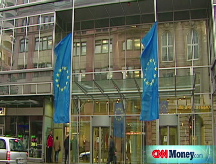Dollar falls after Fed rate cut
The euro surges after the U.S. central bank lowers the interest rate to near zero and signals further unconventional moves may be on the way.
NEW YORK (CNNMoney.com) -- The U.S. dollar fell sharply against major currencies Tuesday after the Federal Reserve announced its decision to cut interest rates.
The central bank said it will establish a target range for its key rate of between 0% and 0.25%. The Fed also said it will establish a discount rate of 0.5%.
In addition to the interest rate policy changes, the Fed also signaled that it will continue to explore more unconventional ways to boost economic activity.
The dollar fell sharply against the euro immediately after the Fed's announcement. The 15-nation currency jumped nearly one cent to $1.3890 from $1.3794 just before the rate cut. The euro traded at $1.4038 late Tuesday.
The pound also surged against the dollar, trading at $1.5388 from $1.5285 before the announcement. It rose to $1.5581 late Tuesday.
Against the Japanese yen, the dollar weakened further to ¥89.21 from ¥90.09 before the announcement, and ¥90.66 on Monday.
The Japanese currency neared a 13-year high early Tuesday, rallying to ¥89.79 before relenting to ¥90.12 later in the morning. It sank to ¥88.95 late Tuesday.
While interest rate cuts are the Fed's main tool for boosting economic activity, many currency analysts worry about the long-term effects of lower interest rates on the dollar.
Cutting interest rates to such historic lows could drive up inflation in the future. And lower rates can reduce the appeal of many assets that are priced in dollars.
Meanwhile, the dollar's status as the world's reserve currency is being hampered by lower rates, as well as the cost of the government's bailouts, according to Ashraf Laidi, currency strategist at CMC Markets.
In addition to aggressive rate cuts, the government has been forced to essentially print more money to help pay for several new initiatives aimed at aiding the weak economy. Flooding the economy with cash has helped ease the credit crunch, but it has also worked to undermine the dollar's strength.
Having interest rates approaching 0% gives rise to "ominous prospects for the greenback once global economic stability starts to build up," Laidi said.
Looking ahead, IDEAGlobal foreign currency analyst Kevin Chau expects the dollar to weaken against both the euro and the yen in the new year.
"The yen is continuing to be a safe haven currency for now," Chau said. "This is because Japan is a creditor nation, not a debtor nation, and the Japanese banks also aren't in as much trouble as U.S. banks," he said.
A key gauge of inflation, the Consumer Price Index, fell 1.7% under pressure from plunging energy prices in November, the largest monthly decline on record.
Core CPI, which does not include volatile energy and food prices, held steady in November and was 2% higher on a 12-month basis.
The weak U.S. housing market continued its decline, as housing starts and building permits fell to record lows in November. ![]()



